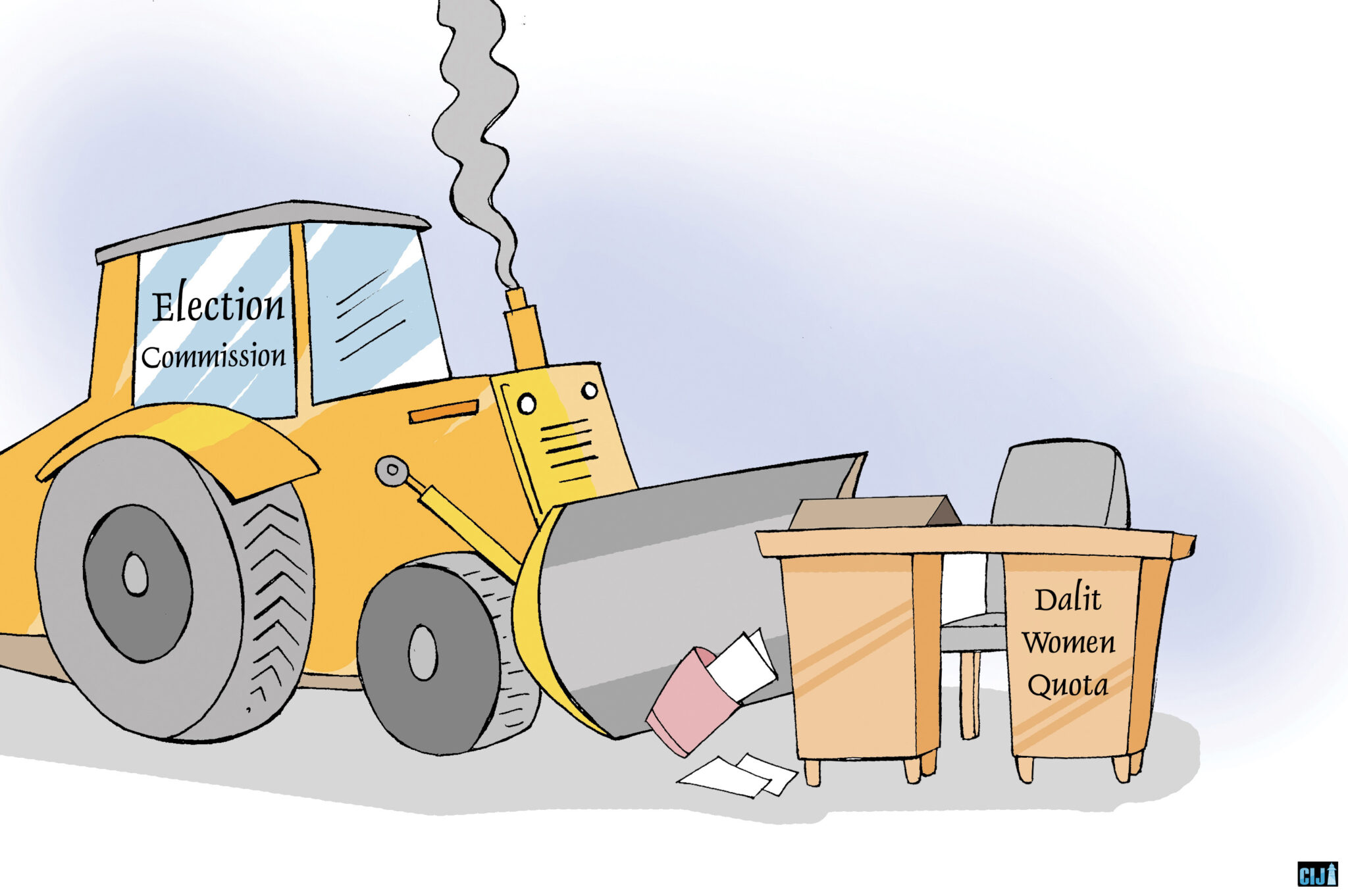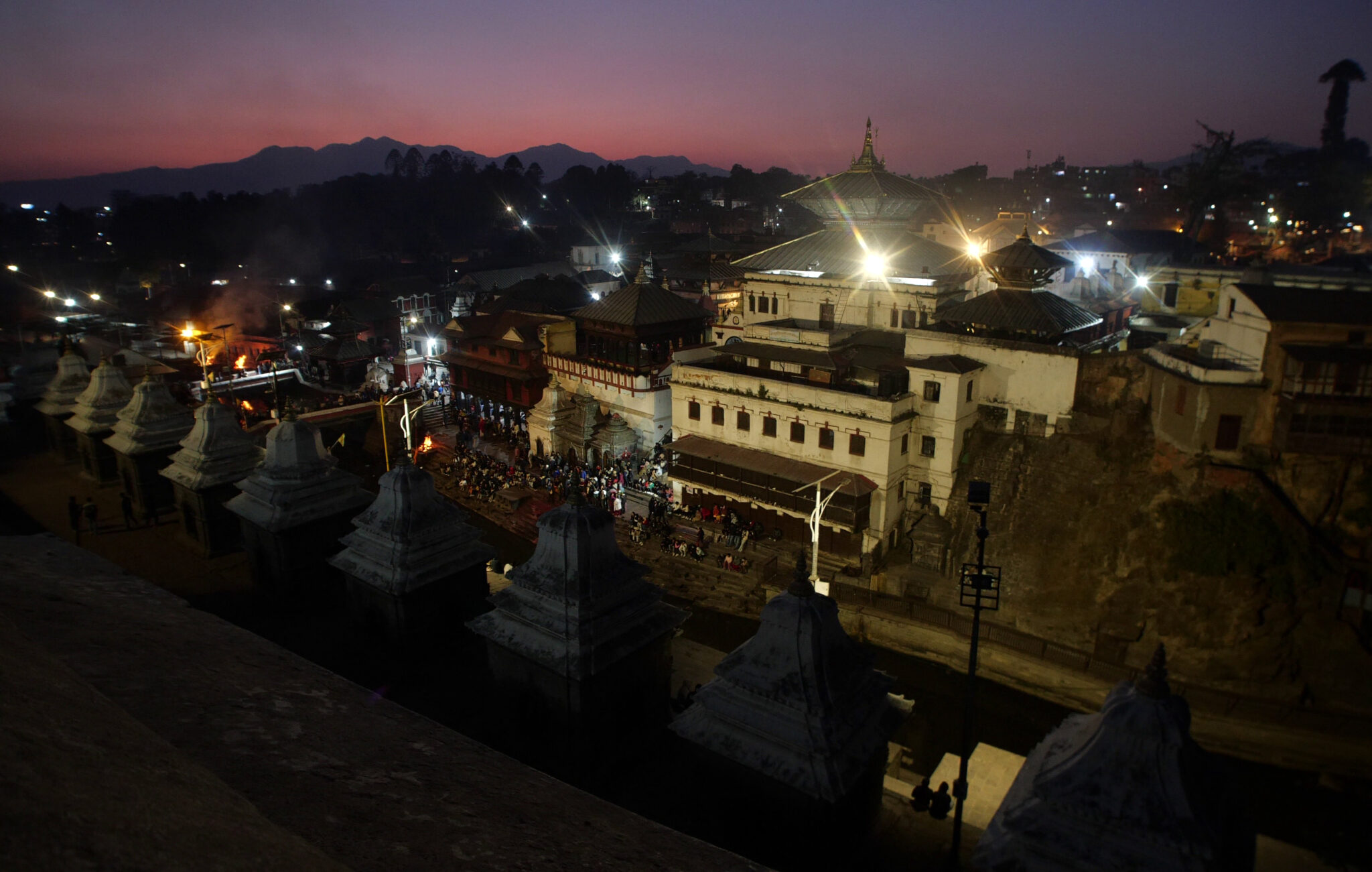Information about the strength and weakness of parties and candidates reaches political parties’ meetings way ahead of elections. Here’s a deep dive into how the agencies are being misused, threatening the spirit of fair elections.
Rameshwar Bohara |CIJ, Nepal
In mid-July this year, Home Minister Balkrishna Khand, who is also a Nepali Congress leader, presented a statistic, which he said was based on a ‘secretive report’, at the party’s central committee meeting that changed the atmosphere of the meeting.
The elections for the House of Representatives and provincial assemblies were yet to be announced then and the leaders of the ruling coalition were working hard to forge an electoral alliance. To ensure the fraught alliance’s longevity, ‘marathon meetings’ were being held. In Congress, leaders from the faction opposing Sher Bahadur Deuba were adamant the party shouldn’t contest elections under an alliance.
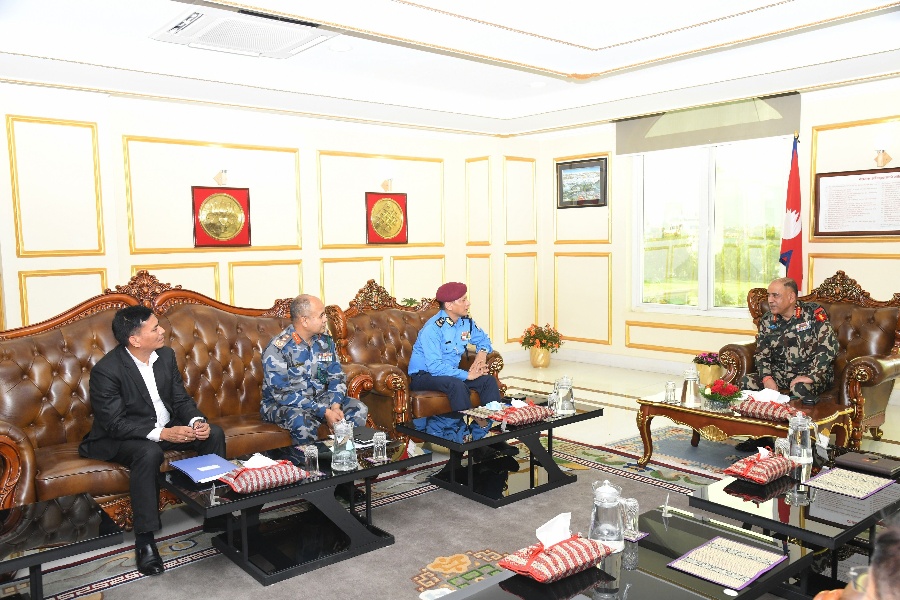
Chiefs of all the four security agencies in a meeting called by Chief of Army Staff Prabhuram Sharma at Jangi Adda. Photo Credit: Nepal Army
That day, Khand had presented separate projections of the seats the party would win if the party went to the elections with or without an alliance. If all the parties contested elections solely, of the total 165 seats, Congress would win 77, CPM-UML 70, Maoist Centre 8, Janata Samajbadi Party 4, Loktantrik Samajbadi 2, CPN (Unified Socialist) 1, Nepal Majdoor Kishan Party 1 and two other seats couldn’t be ‘pinned down’—such was the home minister’s ‘briefing’.
According to the briefing, Congress would become the closest contender in 79 constituencies, would come third in 7, and fourth in 1 constituency. The UML, so Khand’s briefing went, would come in second at 66 constituencies, third in 22, fourth in 4, fifth in 2 and sixth in 1; the Maoist Centre would come in second in 10 constituencies, third in 83, fourth in 29 and fifth in 23 constituencies.
But taking into account other potential equations, the results wouldn’t be as simple as that. “To draw such a result, we shouldn’t let the Maoists partner with other parties,” a leader privy to the meeting quoted Khand as saying. “Even so, Congress and UML’s position would be almost similar. On the other hand, there could be separate alliances between Congress and Maoists, and between UML, Unified Socialist and Rastriya Prajatantra Party. Given this happens, it appears the Congress-Maoist alliance could secure 109 seats and the UML’s alliance 56.”
Then Khand shared the projection if Congress contested solely and the UML, Maoists and other parties under a joint alliance. In that situation, Congress would be limited to 20 seats overall in the Parliament. This would be humiliating for Congress, even worse than the 23 seats it had got in 2017 elections.
Citing these statistics, Khand was reiterating that an alliance was imperative for Congress. From that very meeting, the alliance became a “compulsory need” for the party.
From where did the home minister receive such statistics that convinced the party to forge an alliance? According to a leader who was present at the meeting, after questions were raised about the source of the projection, Khand said, “Let us understand this as something received from the home minister’s source of information.”
The home minister had hinted that the data was a ‘fresh projection’ made by intelligence and security agencies. “His presentation and body language hinted that the information was really critical,” the leader said. “He tried to clarify the humiliating situation Congress would face unless there was an electoral alliance.”
Election intelligence: Salvation to the ruling parties, fear to the opposition
Interestingly, Congress leader Minendra Rijal said he was surprised by Khand’s projection, which was similar to the one he had made in a meeting with some central committee members. Rijal’s forecast based on the results of the local level elections was released before Khand’s. A central leader said, “We too were surprised listening to Rijal.” This might mean home minister Khand’s data was related to that same projection based on local elections, and the intelligence and security agencies might have submitted it to him after some updating. Source close to Khand, however, says the intelligence’s data was based on ‘fresh projection’. But wherever the data may have come from, the summary of Khand’s briefing is that ruling parties fully utilize state mechanisms to their favor. This has a long history.
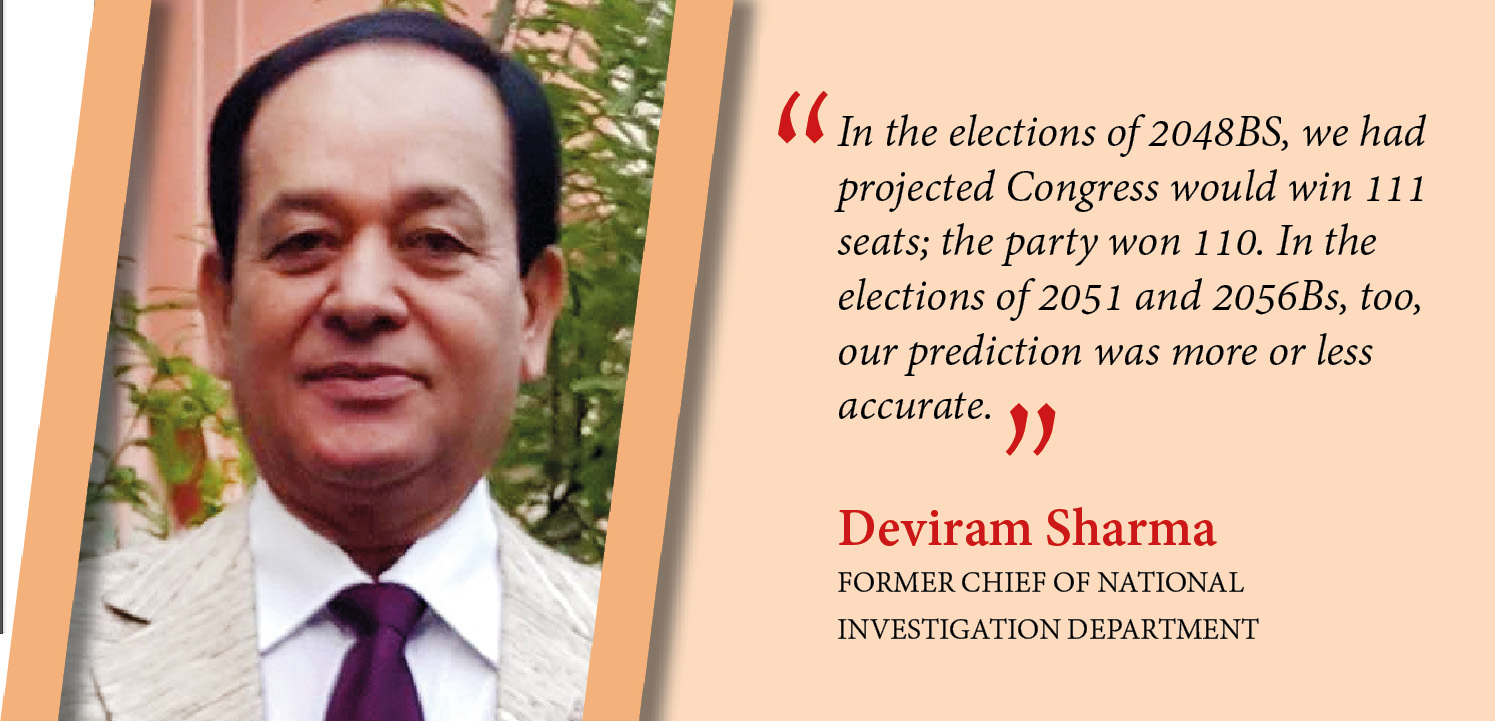
So much so that, intelligence mechanisms are used to predict the results in even the municipal levels. Chitwan’s Bharatpur Metropolitan is an example. Nine days before the May 13 local level elections, Prime Minister and President of Nepali Congress Sher Bahadur Deuba stayed in Bharatpur for two days. A mass demonstration was organized on May 6 to support the alliance’s candidate for Bharatpur Mayor Renu Dahal. Addressing the event, Deuba said that Renu’s loss would lead to a crisis not just in the ruling alliance but also in his own party. The reason was if Renu, the daughter of Maoist Centre chair Pushpa Kamal Dahal, a major stakeholder in the alliance, were to lose, it would hang the ruling alliance by a thread and that would lead the Maoists to forge an alliance with the UML in the general election, leading to an underwhelming performance for the Congress, a repeat of 2017—such was Deuba’s fear.
The source of Deuba’s fear was the intelligence information. His secretariat had asked the National Investigation Department to predict the results of local elections in Bharatpur. The report that the department’s officials submitted to Baluwatar said that Bharatpur didn’t look like a safe zone for Renu. One official who prepared the report says, “The biggest threat to Renu was the dissatisfaction within Congress.”
To avert disaster, Congress sacked Jagannath Poudel, who had announced candidacy against Renu, from general membership. Moreover, six ministers were deployed in Bharatpur for some days. Renu was elected. And it was certain that the ruling alliance would continue until the general elections. The intelligence official says, “I don’t know anything else, but if Baluwatar hadn’t received the report in time, Bharatpur’s results would have turned out any way.”
That ruling parties use intelligence and security agencies to cull potential election results is not new anymore. But does that data match with the actual result? Deviram Sharma, former chief of National Investigation Department, clarifies with examples, “In the elections of 2048BS, we had projected Congress would win 111 seats; the party won 110. In the elections of 2051 and 2056Bs, too, our prediction was more or less accurate.”
Sharma says that the department, given it also looks into ‘political intelligence’, keeps on doing such surveys but when deployed by the government, does it more minutely. The office of the prime minister and home ministry also ask Nepal Police, Armed Police Force and CDOs to carry out such surveys. The prime minister’s office also collects such data through the Directorate of Military Intelligence (DGMI).
Formerly under the home ministry, the National Investigation Department is now under the office of the prime minister. Even though the military is associated with the defense ministry for administrative works, it is directly connected to the office of prime minister. Currently, Prime Minister Deuba also heads the defense ministry. Though Nepal Police and APF are under the home ministry, lately the prime minister’s office has been dominant towards controlling them. In this context, the information about election results that the ruling party gets is certainly meaningful. But how is it possible that the prediction matches with reality?
Sharma says, “We would look into various aspects such as the parties’ influence, their popularity, their performance while in the government or opposition, and the number of organized cadres through a certain method. Moreover, we’d also look at the influence of candidates fielded, their popularity and any unique selling points. Through which, the projection would be close to truth.”
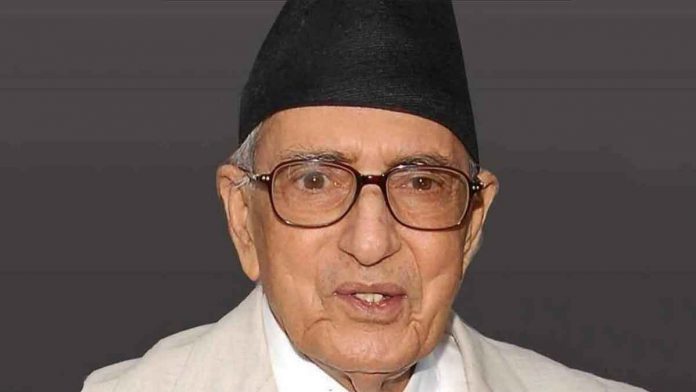
But these considerations alone would make the projection complete, Sharma says. According to him, the intelligence submits a report early on and it measures its ‘proximity’ until election day. “Does the earlier report relate to the latest one? Has the situation changed? If yes, for what reason? Things like things are looked into closely. The information received in such a way becomes the basis for upcoming elections too,” he says.
But it is not that projections always turn out right. In 2051BS, the police and home ministry had reported to Prime Minister Girija Prasad Koirala that Congress would secure a majority. But the investigation department’s officials didn’t agree with it. “We didn’t imagine that Congress would win over 85 seats, and let it be known to the then prime minister, home minister and home secretary Bhojraj Pokharel,” a former intelligence official involved in that analysis said. “The home secretary wondered if the police and CDOs didn’t really understand it and the prime minister even went on to ask if we were aiming for a hung parliament. In the end, Congress won only 83 seats.”
The situation repeated in the first Constituent Assembly of 2064BS. Officials from the investigation department, police and home ministry were reporting that Congress would be the first party. But some officials from the department weren’t so sure. “When we looked at the scenario, the Maoist were staring at a big-margin win, but nobody was ready to believe it,” a former official from the department says. “The results showed that we were right. That’s why it’s important to know how the available data are analyzed.”
The ruling parties are largely the beneficiaries of election intelligence. The ruling parties and their leaders formulate a policy to cull information and use state agencies to implement it.
Bhojraj Pokharel, who was directly involved in collecting information from election intelligence and analyzing it when he was home secretary, later became chief election officer. Pokharel says that while the ruling parties ‘by default’ benefit from the surveys, it is not unusual practice even though state agencies are involved in it. “The organs of the state search for information to know the political atmosphere and how it’s changing. The state should always note such changes and prepare itself accordingly,” he says. “The investigation department is also keeping track of it. The police and the Army do so as well. In the past, the ‘Royal Intelligence Bureau’ would also do it. But then, even the CDOs in the district are keeping tabs on the political atmosphere.”
But those in the opposition never consider it as natural. They always blame the ruling parties for trying to interfere in fair elections. For instance, since these elections were announced, the chair of the opposition CPN-UML kept on accusing Deuba of ‘using state mechanisms’ against his party. In Shrawan 20, Oli, in a meeting with foreign affairs journalists, said, “The ruling alliance institutionally interfered in the local level elections, and in the general elections, too, the government is using state agencies against the UML.”
Oli went on to claim that the government was using intelligence against himself as well. “There is an intelligence behind me. To know what vehicle and carrying what number plate has arrived at my place, four spies are deployed,” Oli had said. Spokesperson of the government and Minister of Communication Gyanendra Bahadur Karki countered Oli’s claim the next day. But this shows how fearful the opposition parties tend to be of the government’s use of intelligence in elections.
Those who have worked in home ministry and security and intelligence agencies for long say the opposition shouldn’t need to worry. “In our case, the opposition are those who want to ascend to power quickly. They were in power in the past, and they might have done a favor for the intelligence officials, and that’s why, the information from the intelligence also reaches the opposition these days,” a former secretary at the home ministry says. “On the other hand, the opposition should be more active and take information from its own party mechanism, and verify and analyze it.”
Inside the interesting world of parties’ own election intelligence
The trend of parties’ devising their own mechanism to collect election-related information is also interesting. Let’s look at the UML’s projection for the second Constituent Assembly election of 2070BS. Some UML leaders had said that the party would win 95 out of 240 seats in direct elections. The party won 90. One of the leaders, Bishnu Rijal, had told us then, “The analysis of data received from the party’s various levels was solid. But after some new unwelcome developments, we lost 3-4 seats.”
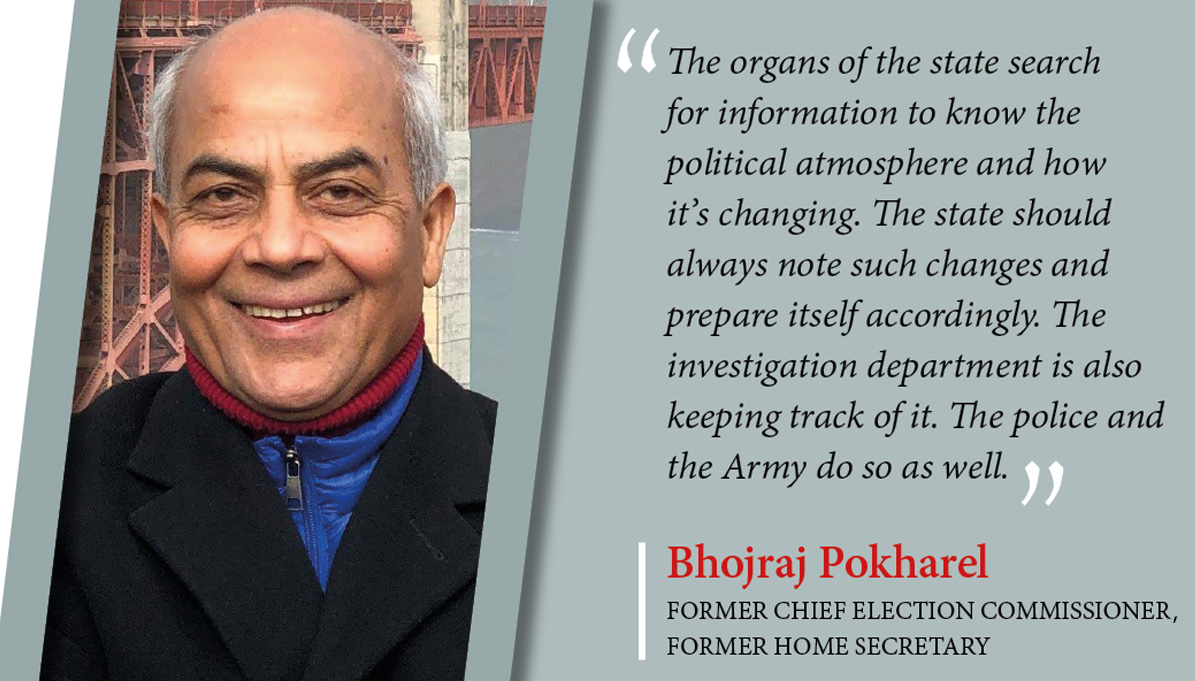
One development Rimal hinted at was in Siraha-5, where Maoist chair Pushpa Kamal Dahal was contesting. Dahal, who had found in two constituencies Kathmandu-10 and Siraha-5, had already lost in the former and was trailing until the end at Siraha-5. Amid this, the constituency reported a ‘difficult situation’ and the counting was halted. Later, Dahal won but by a slim margin. UML candidate Leelanath Shrestha complained of foul play and moved the court. But Shrestha didn’t get justice even after the end of the constituent assembly’s tenure.
The UML’s projection for the 2017 elections was also more or less accurate. But what is the basis of this projection and how does the party get it right? “We receive a certain kind of information from security agencies and we receive further information from the party’s wings on the ground,” a UML leader said. “We form a team to analyze the information, and try to pick the right candidates. We did just that before the local elections this time.”
For the Maoists, who had transitioned to peaceful politics after 10-year-long insurgency, results of both the 2064 and 2070BS elections were unexpected. In 2064, the party was afraid of a possible loss. That’s why, the party pushed for repeated postponement of elections and adopted a policy to propagate both hopes and fears. The results: the party won the elections in a landslide.
The result of the 2070 election, however, was the Maoist’s own doing. The party said that since it couldn’t promulgate the constitution it had desired through the first CA, it would do so by securing a majority this time. But the party faced a drubbing, coming in third.
After that election, even if the party hasn’t contested any polls alone, it has nonetheless predicted its results. Barshaman Pun, the party’s deputy general secretary, says, “We cull the data for potential results through our own intelligence, and also from security agencies.”
At a time in the past, Congress leaders Khum Bahadur Khadka and Govinda Raj Joshi were considered the ‘masterminds’ of election prediction. Both Khadka and Joshi became ministers repeatedly and had influence in security agencies. A Congress leader says, “They would have information whether the party was in the government or not, and they had knowledge of the situation on the ground. Fielding candidates on that basis would be a safe option and that would pay as well.”
In the local level elections this time, the Congress not only mobilized the intelligence and security agencies but also an independent team. A Congress leader who coordinated the team says it was composed of former government officials, retired police personnel and former officers from the investigation department.
State intelligence working for parties?
It is not unnatural for political parties to gather information from their party’s organizational base and mechanism. But is it natural for the investigation department and other security agencies to gather it for them? An official at the department says that since his office works as ordered by the government, it should be considered natural. He insisted that information about the strength or weakness of a candidate and what could tweak the results is not gathered for any particular party but for the government.
Former AIG Devraj Bhatta of the department, however, says a state intelligence mechanism can’t involve itself in election forecasting. “We could argue but a state intelligence can’t work for a party’s benefit,” he said. “But this used to happen previously and keeps happening now. During the Panchayat era, the department was used for political intelligence and rather than security threat assessment, the rulers only thought about how to use, where and by whom. That mindset is still prevalent today.”
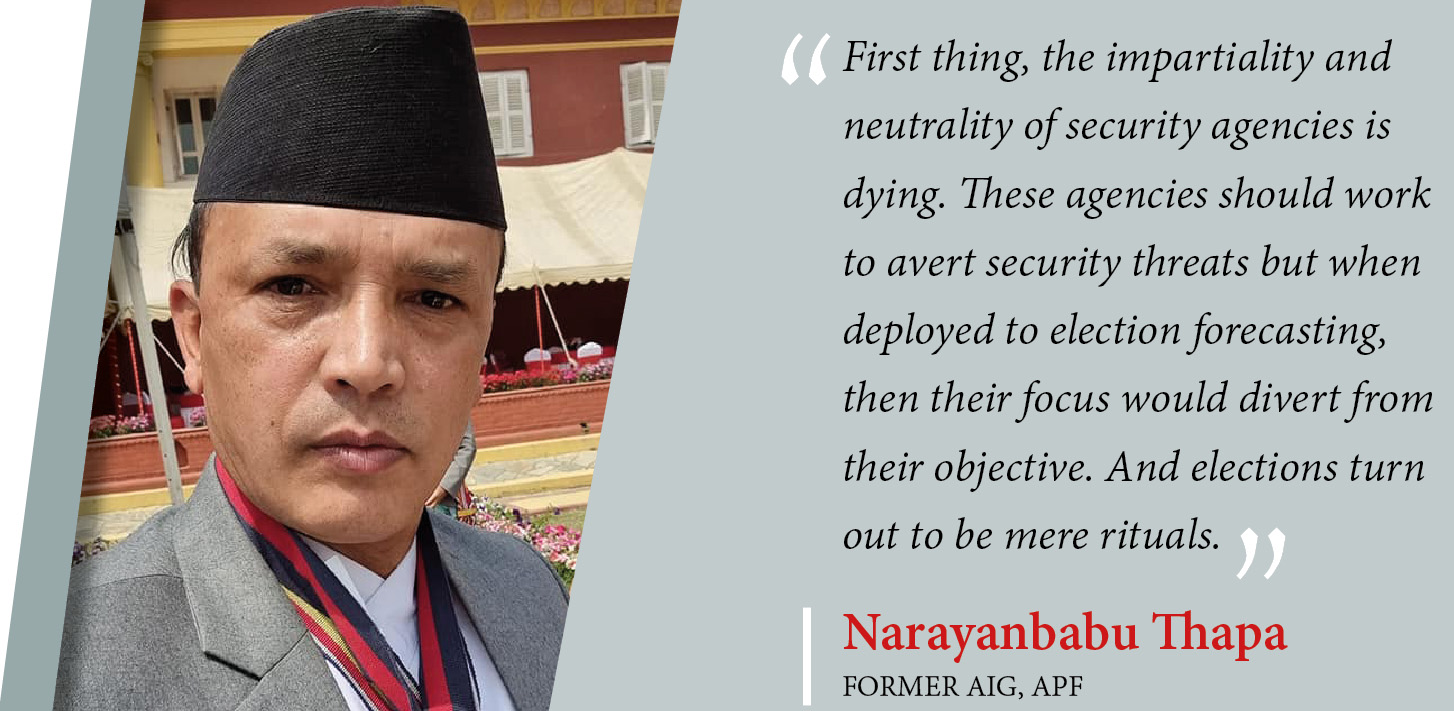
According to Bhatta, there have been discussions about developing the department as an agency that can analyze security threats but it was never just an instrument to work for a certain party. “Intelligence kept on being used only for political intelligence,” he said. “Anyone who was in government did just that. The policy of the parties to resist each other is helped by security-intelligence agencies.”
A retired high-level security official says that the powerful intelligence mechanisms of the department, Army, police and APF are all being used for election forecasting. During a meeting related to election security ahead of May 13 local elections, former AIG Narayanbabu Thapa of APF asked former officials of home ministry, “During my tenure, we would get orders to prepare detailed reports on who was winning and who was losing ahead of every election. When asked with the headquarter, we would be told it was an order from the home ministry and prime minister’s office. I wanted to ask you today, why do you deploy security agencies for such work?” He further said that while he was not sure about the current situation, during his tenure, the trend of trying to abuse security agencies was rife.
Sharma, the former chief of National Investigation Department, says that after knowing wherein lies the gap, parties and leaders try to fill that gap. “They spend money, and those who can distribute money to show immediate development, they use everything in their means,” Sharma says. “CDOs, and security chiefs are transferred for the same purpose.”
But Sharma argues that the trend of parties and leaders trying to use security-intelligence agencies to their favor should be taken as unnatural. “The main thing is the agencies shouldn’t be loyalists to any one party. Intelligence should provide right information to the government, not get used according to their wishes,” he said. “It’d take time for our agencies to be like those in other countries but we shouldn’t be blind loyalists of ruling parties.”
The main purpose of election intelligence used by the state is to identify potential risk of violence, standoffs, and foul play so as to sharpen election security and ensure fair polls. “If violence broke out according to the forecast disturbing the polls, then the intelligence agencies should ask the Election Commission about who is responsible,” Sharma says. “They shouldn’t be pointing at the opposition’s faults only, but also that of the ruling parties. If the election is disturbed by the ruling parties’ doing, then they should let them know as well.”
Intelligence information is also used to influence potential results. Ahead of the second Constituent Assembly elections, the intelligence had predicted that Pushpakamal Dahal and Bijay Kumar Gachchhadar could lose the polls in their respective constituencies of Siraha-5 and Sunsari-3. Both had contested polls from two constituencies, Dahal also from Kathmandu-10 and Gachchhadar from Morang-7.
At that time, fear was rife among political circles that their loss would lead to a ‘risky situation’. It was a time when the first Constituent Assembly had expired and the second one was being elected. The peace process had yet to be concluded. And in Madhesh, the dissatisfaction was still widespread after protests for identity and rights. Dahal and Gachchhadar were the most notable faces representing these two contexts.
According to security and intelligence officials working at that time, the top leadership had ordered them to ‘pay attention’ to Dahal’s constituency in Siraha and Gachchhadar’s in Sunsari. And as it happened, Dahal lost in Kathmandu-10 and Gachchhadar in Morang-10. Both were trailing in their other constituencies until the end.
As vote counting inched towards the end in Siraha-5 and Sunsari-3, it was suddenly interrupted. The security was intensified. And after the recounting was over, Dahal and Gachchhadar won by slim margins.
Their close rivals UML’s Leelanath Shreshta in Siraha and Bhagwati Chaudhary in Sunsari refused to accept the results, complaining of foul play. Chaudhary held a press meet and said there was an institutional foul play against her while Shrestha moved the supreme court with a writ petition. Shrestha says, “There was an institutional bias against me, and they played it foul against me while counting the ballots.”
Girija Prasad, the odd one out
Before the midterm elections of 2051BS, intra-party conflict was at its peak in Nepali Congress. Because of that conflict, Prime Minister Girija Prasad Koirala dissolved the parliament, which had the party’s majority, within three years. At that time, security agencies had predicted a Congress majority in the elections.
Around three weeks before the elections, the projections had it that Congress would win 120 seats in the 205-seat parliament. Amid this, leaders such as Ganeshman Singh openly engaged in campaigning against Girija Prasad and that changed the whole scenario. “It was about one week before the elections. We told the prime minister that his party was losing, and that it wouldn’t get any more than 85 seats,” says an official who worked at the home ministry then. “He said the elections are always won by autocrats, and that he believed in democracy. He further said that an election called by Girija Prasad should be peaceful and asked us to work to ensure that.”
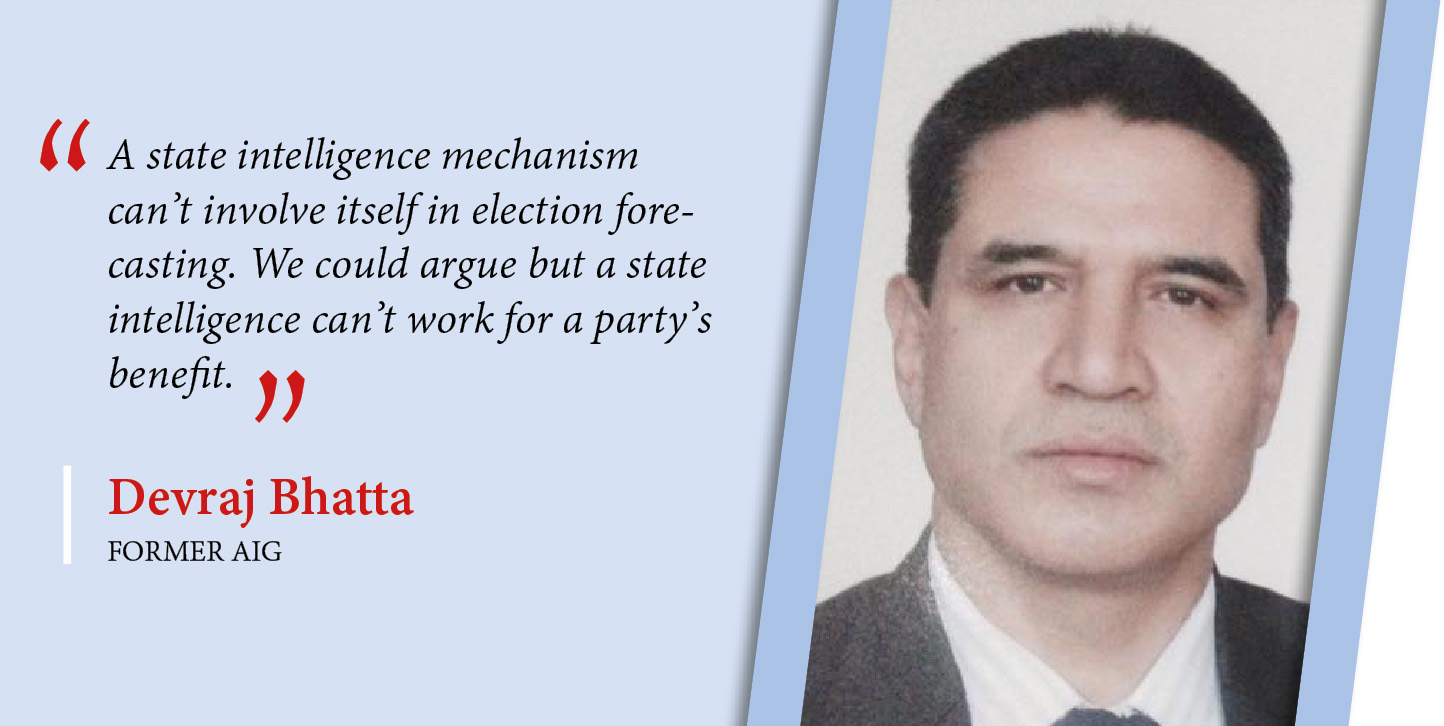
A security official who had heard these words from Girija Prasad then says, “Many leaders close to him tried hard to turn election results to their favor. Girija Prasad could have used some last-gasp measures to ensure victory, but he was simply not interested.”
It was also Girija Prasad who was leading the government ahead of the Constituent Assembly elections in 2006. He was also the head of state then. Because he had led the Mass Movement and played an instrumental role in bringing Maoists to peaceful politics, he was widely accepted across the political spectrum.
Rukmangad Katuwal, then Chief of Army Staff who had all the intelligence reports, had repeatedly told Girija Prasad that Congress was going to lose. Though Krishna Prasad Sitaula had said Congress’s position was good, Girija Prasad had received reports to the contrary from various other agencies.
Koirala had even sent some of his loyalists on a trip from east to west. They also came with the reports that Congress was losing. “One day, Koirala gathered Sitaula and Katawal together and asked his loyalist who had returned from the trip to brief about what he saw. He said Congress was losing and Sitaula was also losing from Jhapa,” a leader privy to the meeting then said. “Then Katawal shouted that he had already said just the same thing and why was Congress contesting an election that it was going to lose.”
After Katawal and Sitaula left, Girijaprasad told the leader, “I know Congress is losing. But this election should happen despite that. If I don’t hold this election now, the country would see ruin. I’d rather accept the loss than see the country’s ruin.”
The election was repeatedly postponed then. The reason behind this was the fear rife in the parties. They were all analyzing the data culled by their sources, predicting their loss. “Others were worried about loss but Girijababu had solid information that Congress was losing,” said a former security officer who Koirala would often consult with then. “He was worried that if the elections were further postponed that would disturb the peace process and the whole existence of the country would be threatened. That’s why he held the election no matter what the results might be.”
Former chief election commissioner Bhojraj Pokharel says that regarding the information received from intelligence, how it is used depends on the person or official acting on it. Pokharel was home secretary during the 2051 midterm elections, and chief election commissioner during the 2064 constituent assembly elections. He was an important person behind both the elections that Koirala conducted. Without citing Koirala said, “What is the foresightedness of the character? If he thinks beyond his interests, then that’s not a problem, but if he centers himself in everything, then he could use the information to his favor.”
Like Pokharel says, currently, there is a dangerous trend among politicians to not hesitate to harm the country for personal or some petty factional interests.
In the 2020 elections in the US, one such sensational news about election intelligence made headlines. The country’s intelligence officers held a press meeting to announce that countries like Iran and Russia were sending emails to Democrat voters to scare them.
The news agency Reuters had reported about it quoting the then Director of National Intelligence John Ratcliffe, “…government officials “have already seen Iran sending spoofed emails designed to intimidate voters, incite social unrest and damage President (Donald) Trump.” Trump was then contesting for a reelection.
The US’s Office of the Director of National Intelligence has said election spying is a threat to American democracy. The agency has pointed to external influence and interference and has established an Intelligence Community to protect democracy.
How do Nepal’s intelligence agencies compare to the one in the US that didn’t shy away from affronting the incumbent President? Pokharel, who once conducted an intelligence mechanism at the home ministry, says, “In the past, these agencies weren’t politicized yet. There was capacity and integrity to some extent. Today, no organization remains untouched by politicization. The trend of officials working as if they are party cadres is on the rise.”
This begs the question, how would an election be if the security and intelligence agencies tasked with ensuring fair polls themselves engage in benefitting certain parties? Former AIG Narayanbabu Thapa of APF says, “First thing, the impartiality and neutrality of security agencies is dying. These agencies should work to avert security threats but when deployed to election forecasting, then their focus would divert from their objective. And elections turn out to be mere rituals.”

